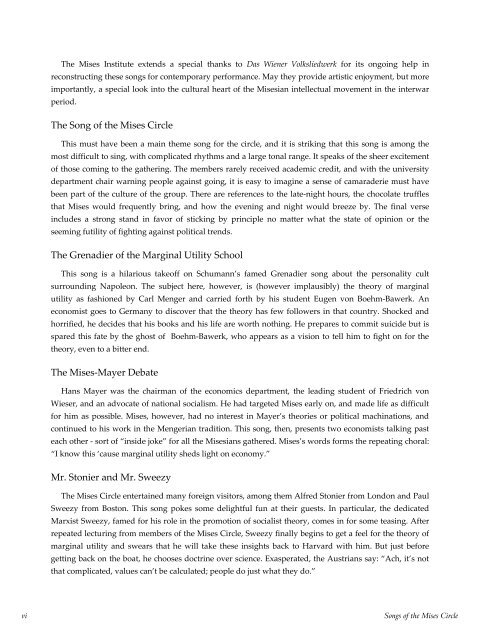Songs of the Mises-Kreis - Ludwig von Mises Institute
Songs of the Mises-Kreis - Ludwig von Mises Institute
Songs of the Mises-Kreis - Ludwig von Mises Institute
You also want an ePaper? Increase the reach of your titles
YUMPU automatically turns print PDFs into web optimized ePapers that Google loves.
The <strong>Mises</strong> <strong>Institute</strong> extends a special thanks to Das Wiener Volksliedwerk for its ongoing help in<br />
reconstructing <strong>the</strong>se songs for contemporary performance. May <strong>the</strong>y provide artistic enjoyment, but more<br />
importantly, a special look into <strong>the</strong> cultural heart <strong>of</strong> <strong>the</strong> <strong>Mises</strong>ian intellectual movement in <strong>the</strong> interwar<br />
period.<br />
The Song <strong>of</strong> <strong>the</strong> <strong>Mises</strong> Circle<br />
This must have been a main <strong>the</strong>me song for <strong>the</strong> circle, and it is striking that this song is among <strong>the</strong><br />
most difficult to sing, with complicated rhythms and a large tonal range. It speaks <strong>of</strong> <strong>the</strong> sheer excitement<br />
<strong>of</strong> those coming to <strong>the</strong> ga<strong>the</strong>ring. The members rarely received academic credit, and with <strong>the</strong> university<br />
department chair warning people against going, it is easy to imagine a sense <strong>of</strong> camaraderie must have<br />
been part <strong>of</strong> <strong>the</strong> culture <strong>of</strong> <strong>the</strong> group. There are references to <strong>the</strong> late‐night hours, <strong>the</strong> chocolate truffles<br />
that <strong>Mises</strong> would frequently bring, and how <strong>the</strong> evening and night would breeze by. The final verse<br />
includes a strong stand in favor <strong>of</strong> sticking by principle no matter what <strong>the</strong> state <strong>of</strong> opinion or <strong>the</strong><br />
seeming futility <strong>of</strong> fighting against political trends.<br />
The Grenadier <strong>of</strong> <strong>the</strong> Marginal Utility School<br />
This song is a hilarious take<strong>of</strong>f on Schumann’s famed Grenadier song about <strong>the</strong> personality cult<br />
surrounding Napoleon. The subject here, however, is (however implausibly) <strong>the</strong> <strong>the</strong>ory <strong>of</strong> marginal<br />
utility as fashioned by Carl Menger and carried forth by his student Eugen <strong>von</strong> Boehm‐Bawerk. An<br />
economist goes to Germany to discover that <strong>the</strong> <strong>the</strong>ory has few followers in that country. Shocked and<br />
horrified, he decides that his books and his life are worth nothing. He prepares to commit suicide but is<br />
spared this fate by <strong>the</strong> ghost <strong>of</strong> Boehm‐Bawerk, who appears as a vision to tell him to fight on for <strong>the</strong><br />
<strong>the</strong>ory, even to a bitter end.<br />
The <strong>Mises</strong>‐Mayer Debate<br />
Hans Mayer was <strong>the</strong> chairman <strong>of</strong> <strong>the</strong> economics department, <strong>the</strong> leading student <strong>of</strong> Friedrich <strong>von</strong><br />
Wieser, and an advocate <strong>of</strong> national socialism. He had targeted <strong>Mises</strong> early on, and made life as difficult<br />
for him as possible. <strong>Mises</strong>, however, had no interest in Mayer’s <strong>the</strong>ories or political machinations, and<br />
continued to his work in <strong>the</strong> Mengerian tradition. This song, <strong>the</strong>n, presents two economists talking past<br />
each o<strong>the</strong>r ‐ sort <strong>of</strong> “inside joke” for all <strong>the</strong> <strong>Mises</strong>ians ga<strong>the</strong>red. <strong>Mises</strong>’s words forms <strong>the</strong> repeating choral:<br />
“I know this ‘cause marginal utility sheds light on economy.”<br />
Mr. Stonier and Mr. Sweezy<br />
The <strong>Mises</strong> Circle entertained many foreign visitors, among <strong>the</strong>m Alfred Stonier from London and Paul<br />
Sweezy from Boston. This song pokes some delightful fun at <strong>the</strong>ir guests. In particular, <strong>the</strong> dedicated<br />
Marxist Sweezy, famed for his role in <strong>the</strong> promotion <strong>of</strong> socialist <strong>the</strong>ory, comes in for some teasing. After<br />
repeated lecturing from members <strong>of</strong> <strong>the</strong> <strong>Mises</strong> Circle, Sweezy finally begins to get a feel for <strong>the</strong> <strong>the</strong>ory <strong>of</strong><br />
marginal utility and swears that he will take <strong>the</strong>se insights back to Harvard with him. But just before<br />
getting back on <strong>the</strong> boat, he chooses doctrine over science. Exasperated, <strong>the</strong> Austrians say: “Ach, it’s not<br />
that complicated, values can’t be calculated; people do just what <strong>the</strong>y do.”<br />
vi <strong>Songs</strong> <strong>of</strong> <strong>the</strong> <strong>Mises</strong> Circle

















